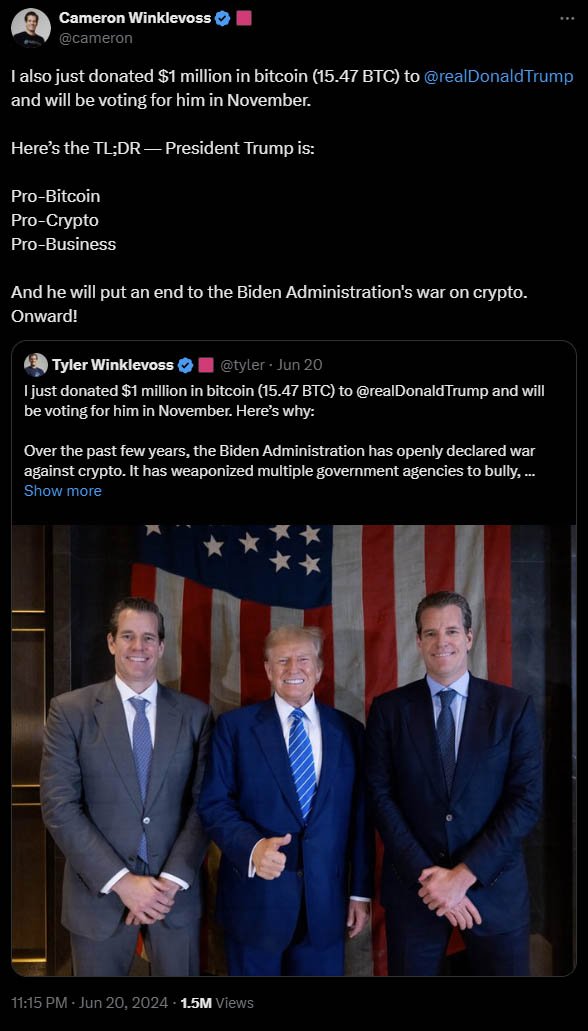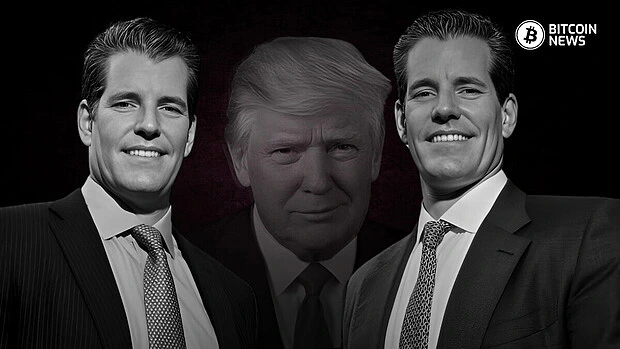In a recent turn of events, the Winklevoss twins, renowned Bitcoin investors and founders of the Gemini exchange, found themselves at the center of a political fundraising story.
Cameron and Tyler Winklevoss, famous for their legal battles with Facebook founder Mark Zuckerberg and their significant contributions to the digital asset world, made headlines again with their donations to Donald Trump’s 2024 presidential campaign.
However, their generous contributions exceeded federal legal limits, prompting refunds from the Trump campaign.
The story began when the Winklevoss twins decided to support Donald Trump’s presidential bid by donating bitcoin. Each twin contributed bitcoin equivalent to $1 million, totaling $2 million in donations.
This substantial contribution was intended to bolster Trump’s campaign and highlight his pro-Bitcoin stance. Tyler Winklevoss clearly expressed his support on social media platform X.

However, according to federal laws, a presidential campaign can only accept a maximum donation of $844,600 from each individual. The Winklevoss twins’ $1 million donations far exceeded this limit, resulting in a total of $310,800 that had to be refunded ($155,400 each).
A campaign official, who spoke on the condition of anonymity, confirmed that the excess funds were returned to the Winklevoss twins. It remains unclear whether the refund was processed in bitcoin or its cash equivalent.
The donations were initially intended to be distributed among several entities supporting Trump, including his campaign, a leadership political action committee (PAC) that pays his legal bills, the Republican National Committee, and 42 GOP state party committees.
Despite the refund, the gesture underscored the growing relationship between Trump and the Bitcoin industry. Trump has actively sought the support of the community, presenting himself as a champion for digital assets.
His campaign has focused on opposing what he describes as President Joe Biden’s “war on crypto,” promising to create a more favorable regulatory environment for the industry.
Related: Trump Backs Bitcoin in 2024 Bid
Trump’s engagement with the digital assets world is not new. He has accepted such donations and has openly discussed related policy with notable figures like Elon Musk.
Earlier this month, Trump met with Bitcoin miners at his Mar-a-Lago resort in Florida, further cementing his relationship with the digital asset community.
During an address to the Libertarian Party convention, he even pledged to commute the sentence of Ross Ulbricht, the convicted founder of the Silk Road online marketplace.
Brian Hughes, a senior adviser to Trump’s campaign, emphasized the campaign’s stance, stating:
“Crypto innovators and others in the technology sector are under attack from Biden and Democrats. While Biden stifles innovation with more regulation and higher taxes, President Trump is ready to encourage American leadership.”
Other industry leaders also support Trump is his 2024 bid.
According to reports, Brian Morgenstein, the policy head at Bitcoin mining company Riot Platforms, stated: “President Trump will protect your right to own Bitcoin, to mine Bitcoin, to transact with Bitcoin, and for many of us, to work in the Bitcoin industry.”
The Winklevoss twins’ support for Trump is a clear indication of their belief in his pro-Bitcoin stance.
The twins, who also run Winklevoss Capital Management, have been vocal about their criticism of the current administration’s regulatory approach to digital assets. They argue that Biden’s policies are detrimental to innovation and growth in the sector.
Tyler Winklevoss described Trump as the leader of a “crypto army,” urging the digital asset community to support his candidacy.
This endorsement comes at a time when the Bitcoin industry is seeking allies who will advocate for a lighter regulatory touch and foster an environment conducive to innovation and growth.
While the Winklevoss twins are prominent figures in the digital assets world, their ventures have not been without controversy.
The Gemini exchange, which they co-founded, was involved in the now-defunct Gemini Earn program. This program allowed users to earn yield on their digital assets and was operated jointly with Genesis, which filed for bankruptcy in January 2023.
As a result, many users of Gemini Earn spent months trying to recover their funds. In a settlement with the New York Department of Financial Services (NYDFS), Gemini agreed in February to return at least $1.1 billion to customers.
By May, Gemini reported that Earn users collectively received over $2.18 billion of their assets, representing 97% of all assets owed to Earn users. The New York Attorney General’s office also recovered about $50 million from Gemini for users who were allegedly defrauded.
Despite Trump’s pro-Bitcoin stance and the support from high-profile Bitcoin figures like the Winklevoss twins, his campaign’s fundraising efforts in this sector have faced challenges.
According to analysis by Breadcrumbs, a blockchain data firm, Trump’s campaign had only raised around $59,000 in digital asset donations. This amount is relatively small compared to the over $260 million the campaign has raised through traditional means.
James Delmore, a data analyst at Breadcrumbs, pointed out that the complexity of on-chain donations and high transaction fees have discouraged some potential donors.
The Winklevoss twins’ large donation is part of a growing trend of Bitcoin industry leaders engaging in political funding. Their support for Trump reflects a broader movement within the industry to back candidates who promise favorable regulatory environments for digital assets.
Trump’s outreach to the Bitcoin community is a strategic move to garner support from a burgeoning and influential sector.
As the 2024 presidential election approaches, it is likely that more figures from the Bitcoin world will emerge as significant players in political fundraising.










